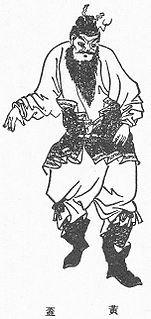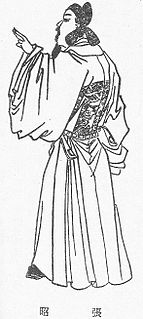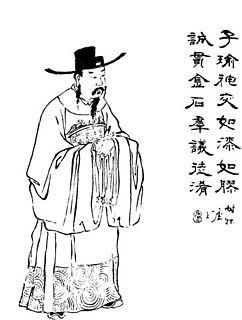 W
WHuang Gai, courtesy name Gongfu, was a military general who served under the warlord Sun Quan during the late Eastern Han dynasty of China. He previously served under Sun Quan's predecessors – Sun Jian and Sun Ce.
 W
WLiu Zhang, courtesy name Jiyu, was a Chinese politician and warlord who served as provincial governor who lived in the late Eastern Han dynasty of China. He became the Governor of Yi Province, succeeding his father Liu Yan and ruled the region until 214, when he surrendered to Liu Bei. Six years later, Liu Zhang again surrendered to Eastern Wu, and died shortly afterwards. Liu Zhang is often considered an incapable leader but is noted to have been the original lord of some of Shu Han's most famous generals and officials such as Fa Zheng, Meng Da, Yan Yan, Liu Ba, Huang Quan, Wu Yi, Li Yan, Dong He and others.
 W
WLu Ji (188–219), courtesy name Gongji, was a Chinese politician and scholar serving under the warlord Sun Quan in the late Eastern Han dynasty of China. He was also one of the 24 Filial Exemplars.
 W
WLü Meng, courtesy name Ziming, was a Chinese military general and politician who served under the warlord Sun Quan during the late Eastern Han dynasty of China. Early in his career, he fought in several battles under the banner of Sun Ce, Sun Quan's elder brother and predecessor. Although he had been noted for his bravery, he was still deemed as nothing more than a "mere warrior" for his lack of literacy skills. Later, with encouragement from Sun Quan, Lü Meng took up scholarly pursuits to improve himself, gradually becoming a learned and competent military leader. In 217, he succeeded Lu Su as the frontline commander of Sun Quan's forces in Jing Province. Two years later, in a carefully calculated military operation, Lü Meng led an invasion of Liu Bei's territories in southern Jing Province, swiftly and stealthily capturing all the lands from Liu Bei's general Guan Yu, who was captured and executed after his defeat. Lü Meng enjoyed his finest hour after the victory but died a few months later because he was already seriously ill before the campaign.
 W
WLu Su (172–217), courtesy name Zijing, was a Chinese military general and politician serving under the warlord Sun Quan during the late Eastern Han dynasty. In the year 200, when Sun Quan had just taken over the reins of power, his adviser Zhou Yu recommended Lu Su as a talent to Sun Quan. As one of Sun Quan's most important advisers in the warlord's early career, Lu Su is best known for making some significant contributions. Firstly, in 200 he drafted a long-term strategy for Sun Quan's power bloc to emerge as one of three major contending powers in China – a plan similar to Zhuge Liang's Longzhong Plan, which was proposed about seven years later. Secondly, before the Battle of Red Cliffs in late 208, he was the first person to persuade Sun Quan to ally with Liu Bei against Cao Cao. Thirdly, he succeeded Zhou Yu as the frontline commander of Sun Quan's forces in 210 after Zhou's death and maintained the Sun–Liu alliance. Fourthly, in 215, he represented Sun Quan at the negotiations with Liu Bei's general Guan Yu during the Sun–Liu territorial dispute over Jing Province.
 W
WZhang Zhao (156–236), courtesy name Zibu, was a Chinese calligrapher, essayist, military general, and politician. He served as an official of the state of Eastern Wu during the Three Kingdoms period of China. Born in the late Eastern Han dynasty, Zhang Zhao started his career as a scholar in his native Xu Province before the chaos towards the end of the Eastern Han dynasty forced him to flee south to the Jiangdong region for shelter. In Jiangdong, Zhang Zhao became an adviser to the rising warlord Sun Ce. After Sun Ce's death in the year 200, Zhang Zhao played a key supporting role to Sun Ce's younger brother and successor, Sun Quan, as he consolidated power and his control over the Jiangdong territories. In 208, Zhang Zhao strongly urged Sun Quan to surrender to Cao Cao, a rival warlord, because he believed that they stood no chance against an impending invasion by Cao Cao. However, Sun Quan refused to listen to Zhang Zhao and instead heeded the advice of Lu Su and Zhou Yu. Sun Quan's forces ultimately scored a decisive victory over Cao Cao at the Battle of Red Cliffs in the winter of 208. From 200 until his death in 236, Zhang Zhao served under Sun Quan through the collapse of the Eastern Han dynasty and into the Three Kingdoms period after Sun Quan became the founding emperor of the Eastern Wu state. Throughout his career, Zhang Zhao was known for being a stern, uncompromising and intimidating figure who commanded respect from both his colleagues and Sun Quan. Despite Zhang Zhao's seniority and experience, Sun Quan passed him over twice as a candidate for the position of Imperial Chancellor in 222 and 225 as he believed that Zhang Zhao was so headstrong and stubborn that he would not be able to effectively lead the administration. Nevertheless, Sun Quan paid his due respects to Zhang Zhao as a mentor-like figure who saw him through his formative years to his accession to the throne.
 W
WZhou Yu (175–210), courtesy name Gongjin, was a Chinese military general and strategist serving under the warlord Sun Ce in the late Eastern Han dynasty of China. After Sun Ce died in the year 200, he continued serving under Sun Quan, Sun Ce's younger brother and successor. Zhou Yu is primarily known for his leading role in defeating the numerically superior forces of the northern warlord Cao Cao at the Battle of Red Cliffs in late 208, and again at the Battle of Jiangling in 209. Zhou Yu's victories served as the bedrock of Sun Quan's regime, which in 222 became Eastern Wu, one of the Three Kingdoms. Zhou Yu did not live to see Sun Quan's enthronement, however, as he died at the age of 35 in 210 while preparing to invade Yi Province. According to the Records of the Three Kingdoms, Zhou Yu was described as a tall and strong man with beautiful appearance. He was also referred to as "Master Zhou". However, his popular moniker "Zhou the Beautiful Youth" does not appear in either the Records or the 14th-century historical novel Romance of the Three Kingdoms. Some Japanese literary scholars such as Yoshikawa Eiji and Koide Fumihiko believe that this was a later invention by Japanese storytellers.
 W
WZhuge Jin, courtesy name Ziyu, was a Chinese military general and politician of the state of Eastern Wu during the Three Kingdoms period of China. Born in the late Eastern Han dynasty, Zhuge Jin started his career in the 200s as an official under the warlord Sun Quan, who later became the founding emperor of Eastern Wu in the Three Kingdoms period. In 215, he served as Sun Quan's representative in a territorial dispute over southern Jing Province between Sun Quan and his ally, Liu Bei. In 219, he joined Sun Quan's general Lü Meng in an invasion of Liu Bei's territories in Jing Province after Sun Quan broke the Sun–Liu alliance. He was subsequently appointed as a general and commandery administrator. Before the Battle of Xiaoting of 221–222, Zhuge Jin attempted to dissuade Liu Bei from going to war with Sun Quan but was unsuccessful. The battle ultimately concluded with victory for Sun Quan's side; both sides made peace later and reestablished an alliance between the Eastern Wu and Shu Han states against their rival state, Cao Wei. From 222 until his death in 241, despite being rather incompetent in military affairs, Zhuge Jin served as one of Eastern Wu's top generals and participated in some battles against Cao Wei forces.